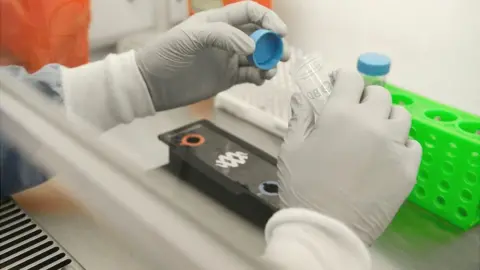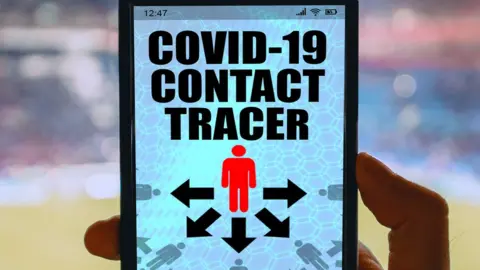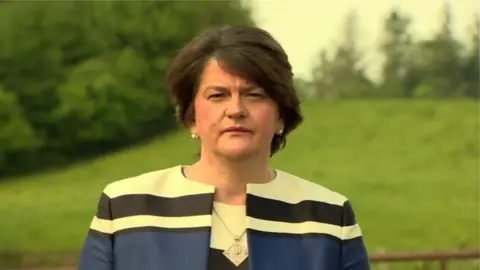Coronavirus: NI contact tracing in touch with 388 people
 EPA
EPANorthern Ireland's contact tracing programme has been in touch with 388 people who have Covid-19 in its first two weeks of operation.
Those calls have led to 518 contacts being traced.
The Department of Health has appealed for anyone with any symptoms of Covid-19 to get tested as quickly as possible.
Symptoms include a raised temperature, a new continuous cough or a loss of sense of smell or taste.
Tests can be arranged for anyone over the age of five by going online or by calling 119.
An appointment will be arranged at one of the four drive-in centres around Northern Ireland.
Anyone who cannot get to one of the centres in Belfast, Craigavon, Londonderry or Enniskillen can request a kit be sent to their home, to be returned to the lab.
People must also isolate at least until they get their test result back.
According to Northern Ireland's chief scientific officer, the contact tracing operation is critical to keep coronavirus under control as the lockdown is relaxed.
 Getty Images
Getty ImagesProf Ian Young accepted there were challenges to the tracing programme, but is confident the public will comply.
The staffing level on the scheme is being scaled up to include nurses and environmental health officers.
Northern Ireland was the first of the four UK administrations to roll out a coronavirus contact tracing programme.
Health Minister Robin Swann said the current contact tracing operation would be bolstered by health professionals, with health protection consultants advising on complex situations and local clusters or outbreaks.
"The work will be supported through the deployment of trained volunteers when required," he said.
Prof Young told BBC Radio Ulster's Good Morning Ulster programme it was important for anyone with a new continuous cough, a high temperature or a loss of the sense of taste or smell to arrange a test so they can enter into the contact system.
He said the contact tracing service has been set up with Public Health Agency with the aim of testing everybody in Northern Ireland who gets a positive result.
He said part of the response to the package will be support for employers and employees who may miss work if they need to self-isolate.
"We are moving into a stage where we are looking for a relatively small number of people to agree to self-isolate for limited periods so the vast majority of society can return gradually to a more normal life," he said.
Prof Young said the safest way of avoiding being asked to self-isolate was to maintain social distancing, which "reduced the chance of being identified as a potential contact".
 PACEMAKER
PACEMAKERShe said contact tracing was vital to "make sure that we know where the virus is in our community".
Although there is currently no mobile app, Mrs Foster said the current manual system was working well.
What is contact tracing?
Contact tracing aims to identify and alert people who have come into contact with a person infected with coronavirus.
It is a crucial component of the "test, trace and isolate" strategy, credited with helping to lift restrictions in other countries.
Someone who has been infected is asked to list all the people they've recently been in prolonged contact with.
Those people will then be tracked down by phone, before potentially being asked to self-isolate for 14 days and, in some cases, offered a test for the virus.

Mr Swann said there would also be a "call centre element to this service which will be able to provide general information to symptomatic individuals and their contacts on a range of Covid-19 issues".
"Digital tools will also be developed to complement the telephone-based contact tracing. Options are under active consideration," he added.

- A SIMPLE GUIDE: How do I protect myself?
- AVOIDING CONTACT: The rules on self-isolation and exercise
- WHAT WE DON'T KNOW How to understand the death toll
- TESTING: Can I get tested for coronavirus?
- LOOK-UP TOOL: Check cases in your area

